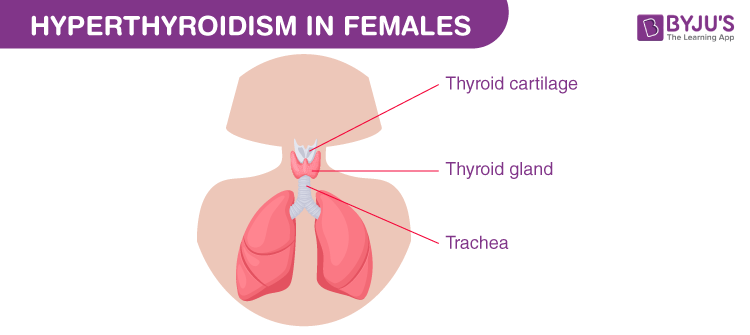The thyroid gland is a part of the endocrine system that is present on both sides of the trachea. It resembles the shape of a butterfly. The thyroid gland synthesises two major hormones that are Tetraiodothyronine or thyroxine (T4) and triiodothyronine (T3). The thyroid gland regulates many physiological processes such as metabolism, heartbeat, growth and body temperature. It is important to maintain the hormonal level within the limits for normal body functioning.

In certain conditions when the hormonal levels are too high or low it causes impairment of thyroid function leading to various disorders. Thyroid disorders are broadly categorised into two categories:
- Hyperthyroidism: When there is excessive secretion of thyroid hormones due to thyroid cancer or nodules formation, it leads to hyperthyroidism. It adversely affects many physiological functions of the body.
- Hypothyroidism: When the thyroid hormone levels are too low it leads to hypothyroidism. Iodine deficiency is one of the causes of hypothyroidism. E.g. Goitre (enlargement of the thyroid gland), Cretinism (stunted growth of baby due to hypothyroidism during pregnancy).
Hyperthyroidism in Females
Hyperthyroidism is more common in females. Females are at high risk. Hyperthyroidism leads to many problems in females such as:
- Osteoporosis: Excess of thyroid hormones can prevent absorption of calcium into bones making it brittle
- Infertility: An overactive thyroid can make it difficult for a woman to get pregnant and has harmful effects on baby and mother during pregnancy
- Changes in menstrual pattern, less frequent periods
- Excessive hair fall
Causes of hyperthyroidism
The synthesis of thyroid hormone is regulated in normal circumstances. There are certain conditions which lead to an overactive thyroid gland and thus leading to overproduction of thyroid hormones.
The main causes of hyperthyroidism are:
- Autoimmune disease: “Grave’s disease” an autoimmune disease is the most common cause of hyperthyroidism. In this, the immune system of the body stimulates the synthesis of more thyroid hormones
- Thyroiditis during pregnancy: Inflammation of the thyroid gland may occur after pregnancy, which results in the swelling of the thyroid gland and leakage of hormone in the bloodstream. Postpartum thyroiditis often leads to hyperthyroidism. The condition is mostly for a short duration and normal function of the thyroid gland is attained
- Thyroid nodules: In the case of thyroid cancer, toxic multinodular goitre, toxic adenoma or Plummer’s disease, too much of thyroxine hormone is produced leading to hyperthyroidism
Symptoms of Hyperthyroidism
The main symptoms of hyperthyroidism include:
- Excessive weight loss and inability to gain weight
- Increased appetite
- Heat sensitivity
- Anxiety, nervousness and irritability
- Excessive sweating
- Heart palpitations, irregular heartbeat (arrhythmia) or rapid heartbeat (tachycardia)
- Fatigue, muscle weakness, tremors in hands and fingers
- Enlargement of the thyroid gland
- Problems in sleeping
- Changes in menstrual pattern
- More frequent bowel movements
- Thinning of skin, brittle and fine hair accompanied with hair fall
- Grave’s ophthalmopathy which includes dry, red and swollen eyes. Protruding eyeballs, inflammation, sensitivity, blurred vision and discomfort in eyes
- Grave’s dermopathy which causes redness and swelling of the skin
- Risk of thyrotoxic crisis, i.e. sudden intensified symptoms like rapid heart rate, fever
Treatment of Hyperthyroidism
There are several treatments present for hyperthyroidism. Choice of treatment depends on age, physical condition, severity and prognosis of the disease.
The possible treatments of hyperthyroidism are:
- Using radioactive iodine which gets absorbed by the thyroid gland. It causes the thyroid gland to shrink
- Taking anti-thyroid medications, which prevent the thyroid gland to synthesise excess of the hormone. These medications can cause side effects like skin rashes, fever, joint pain and even lead to liver damage
- Use of beta-blockers to reduce symptoms like tremors, palpitations and rapid heart rate
- Removal of the thyroid gland (thyroidectomy)
- Corticosteroids to treat Grave’s ophthalmopathy. In some of the cases, eye surgery might be performed to correct abnormalities of eyes
- Reduced iodine intake
- Lifestyle changes e.g. regular exercise and yoga has shown to improve a lot of symptoms associated with hyperthyroidism
This was all about hyperthyroidism. Learn more related concepts as per the NEET syllabus only at BYJU’S.
Also Check:
- How Can The Relationship Between The Hypothalamus And Pituitary Gland Be Described?
- Which Hormone Regulates the Function of Thyroid Gland?
- What Is the Main Function of Renin and Aldosterone?
- Multinodular Goitre
- Flashcards Of Biology For NEET Chemical Coordination And Integration
Recommended Video:


Comments